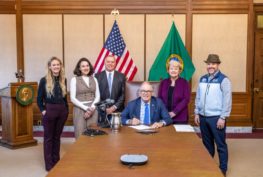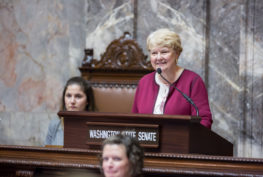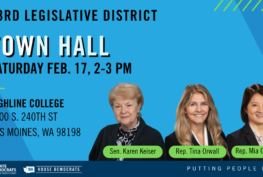Dear neighbors,
These days I am heeding the experts’ advice to stay home and stay healthy – and I hope you are too. Our state and our nation are losing precious lives to this virus, but hopefully the worst days are behind us. Let’s all do our part and get through this safely!
Please do what our health experts advise.
- Maintain a distance of six feet or more from others.
- If you are 60 years old or older, or have an underlying medical condition, you should self-isolate.
- Re-think all daily routines and eliminate interaction that is not essential. As inconvenient as this is, our behavior could mean a life-and-death difference for those most vulnerable to the virus.
- Be there for your family, friends, neighbors and anyone else you think might need help or reassurance. We can keep our distance physically and still be there for each other emotionally by calling, texting or emailing.
If you suspect you may have coronavirus:
- Call your doctor – do not go to the hospital. Your doctor will make an assessment about next steps, and many are using telehealth options. If you require a COVID-19 test, your doctor will contact public health officials to arrange a test.
- If you have symptoms and do not have a doctor to call, you can call the state Department of Health call center at 800-525-0127. You can also call this number if you have general questions about COVID-19 or the state’s response. Phone lines are staffed from 6 a.m. to 10 p.m., seven days a week, with interpreters available.
- Recognizing the serious threat of coronavirus, the Washington Health Benefit Exchange has opened a special enrollment period for health insurance through April 8. Call 1-855-923-4633 between 7:30 a.m. and 5:30 p.m. Monday through Friday.
- The state Insurance Commissioner has required all insurance plans to cover coronavirus tests with no cost-sharing and no prior authorization requirement for people who meet the CDC criteria for testing. The commissioner has also required insurance plans to allow enrollees to refill their prescriptions early one time in order to maintain an adequate supply. You can find more insurance updates at this link.
Know your unemployment options.
- The state offers a range of unemployment assistance to employers and employees, such as reduced or subsidized work schedules and benefits, but not everyone knows about them.
- If an employer has had to temporarily shut down operations, for example, workers may be eligible for unemployment benefits and the employer may receive relief of benefit costs. If workers are asked to isolate or quarantine by a doctor or health official, they may receive unemployment benefits while they are temporarily away from work. And the Legislature has waived the requirement that people in this situation must be actively searching for work.
- Washington has made it faster for those who are unemployed due to COVID-19 to receive unemployment insurance. See if you qualify here.
- In addition, other state agencies are also taking action to help people and businesses disrupted by the pandemic, adjusting resources to address our current extraordinary circumstances. You can access a broader list of resources here.
Where to find the most useful information and updates:
As the scope and nature of the pandemic evolves from day to day, so does the available information and advice. You can sign up for email updates from the state Department of Health here, and you can also check the links below for updates.
- WA’s COVID-19 portal is your one-stop shop for all information related to Covid-19 and is constantly being updated here.
- Statewide statistics: This map has up-to-date statistics on the outbreak in Washington state.
- Other languages: Fact sheets about coronavirus are available in 15 languages here.
- Schools: Do you have questions about school closures? The state Office of the Superintendent of Public Instruction is continuously updating information here.
- Essential business list: Got questions about whether your job or business is considered essential during the governor’s “stay home, stay healthy” order? Find your answer here.
- Personal protective equipment: Washington is seeking to fill shortages of personal protective equipment (PPE) like masks, gowns, and gloves to support our medical system, first responders, public health facilities. Learn how you can help here.
- Emergency volunteer health practitioners: Did you know? Health practitioners who are licensed in other states can help in Washington. Learn how here.
These are challenging times, but I am confident we are up to the challenge. The key now is to be patient, be careful and stay healthy.
We will see this through together,





